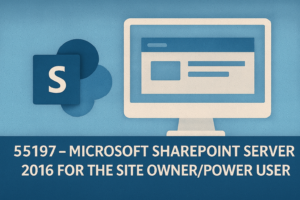Description
Audience Profile
Outcomes
Prerequisites
Onsite Training?
If you need training for three or more people, ask us about training at your site. You can enjoy the convenience of reduced travel cost and time, as well as a familiar environment for your staff. Additionally, we can customise the course for your business needs.
Cancellation Policy
To cancel or, reschedule please contact us 10 days before the course
Contact Details
- 1300-00TECH
- info@new.technisaur.com.au
- Melbourne VIC, Australia
Modules
Module 1: Working with Sites
All content in SharePoint is accessed through a site. A SharePoint site serves as a container for lists and libraries, providing the foundation for content management and basic administration. The layout, content, and structure of a site are initially determined by the site template used during its creation.
Lessons
- Site Templates
- Creating Sites
- Site Navigation
Lab 1: Creating Team Sites
Lab 2: Creating a Blog Site
After completing this module, students will be able to:
- Explain what site templates are and how they work
- Identify and differentiate between the site templates available across various SharePoint versions
- Create a new site using a site template
- Build and configure a Project site
- Build and configure a Team site
- Build and configure a Blog site
- Manage site links in the top link bar
Module 2: Page Content
SharePoint provides multiple options for adding content to site pages. The modern approach—used in Team Site templates—is the wiki-style page. An alternative method, available since the early versions of SharePoint, involves using Web Part pages. Both approaches allow users to insert Web Parts and offer flexible layout and presentation capabilities.
Lessons
- Wiki Library Pages
- Web Part Pages
- Working with Web Parts
Lab 1: Working with Wiki Pages
After completing this module, students will be able to:
- Explain the purpose and structure of wiki pages
- Understand Web Part pages and the role of Web Parts
- Add content to the Team Site home page
- Modify the layout of the home page
- Create new wiki pages
- Create new Web Part pages
- Add and configure Web Parts on pages
Module 3 : Columns and Content Types
Customising SharePoint in a reusable way can be achieved by creating Site Columns and Content Types. Site Columns are similar to list and library columns but are created at the site level and can be reused across that site and its subsites. Content Types are built from Site Columns, and can include document templates, workflows, and other settings. Once created, Content Types can be associated with lists and libraries for consistent metadata and behaviour.
Lessons
- Site Column Gallery
- Creating Site Columns
- Site Content Type Gallery
- Creating Content Types
Lab 1: Creating and Working with Content Types
Lab 2: Adding a Content Type to a Library
After completing this module, students will be able to:
- Understand the role and function of Site Columns
- Understand the structure and purpose of Content Types
- Create and manage Site Columns
- Create and configure Content Types
- Develop and associate document templates with Content Types
- Assign Content Types to lists or libraries
- Create items based on custom Content Types
Module 4 : Office Integration
One of SharePoint’s key strengths is its integration with Microsoft Office applications. This module focuses on integration with Office Online, the browser-based version of Microsoft Office that enables users to view and edit Office documents within SharePoint. While Office Online offers convenience, it also comes with some functional limitations compared to the full desktop versions.
Lessons
Lab 1: Office Integration
After completing this module, students will be able to:
- Integrate SharePoint with Office Online applications
Set up and manage alerts for SharePoint documents or lists
Module 5 : Managing SharePoint Site Permissions
Permissions in SharePoint are initially set when a site is created. By default, permissions from the top-level site (site collection root) are inherited by all child sites. This inheritance can be broken at any level—site, list, library, or even individual items. Permissions can be assigned to SharePoint groups, individual users, or external groups such as Windows security groups.
Lessons
- SharePoint Groups
- Assigning Permissions
- Permission Inheritance
Lab 1: Working with SharePoint Permissions
After completing this module, students will be able to:
- Understand how SharePoint groups work
- Create and manage SharePoint groups
- Assign permissions to groups and users
- Manage permission inheritance at the site level
- Configure unique permissions at the list or library level





Reviews
There are no reviews yet.